
 Definition:
Definition: The Drafters of the Universal Declaration of Human Rights
The Drafters of the Universal Declaration of Human Rights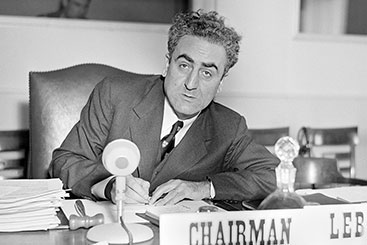
Dr. Charles Malik (Lebanon)
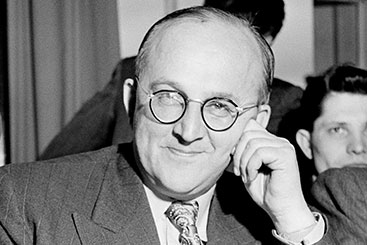
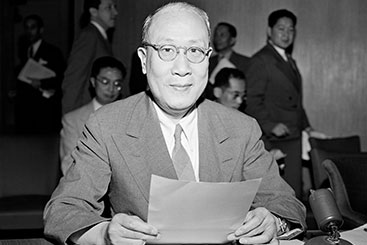
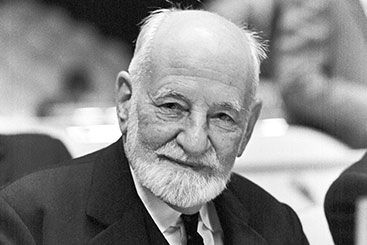
 Reference: The Drafters of the Universal Declaration of Human Rights
Reference: The Drafters of the Universal Declaration of Human Rights
 Vocabulary:
Vocabulary:
 degrading /dɪˈɡreɪ.dɪŋ/: causing people to feel that they have no value. (synonym: humiliating)
degrading /dɪˈɡreɪ.dɪŋ/: causing people to feel that they have no value. (synonym: humiliating)
 Examples:
Examples:
 It is so degrading to have to ask for money.
It is so degrading to have to ask for money.
 No one should have to suffer such degrading treatment.
No one should have to suffer such degrading treatment.
 discrimination /dɪˌskrɪm.ɪˈneɪ.ʃən/: treating a person or particular group of people differently, especially in a worse way from the way in which you treat other people, because of their skin colour, sex, sexuality, etc.
discrimination /dɪˌskrɪm.ɪˈneɪ.ʃən/: treating a person or particular group of people differently, especially in a worse way from the way in which you treat other people, because of their skin colour, sex, sexuality, etc.
 Examples:
Examples:
 Until 1986 most companies would not even allow women to take the exams, but such blatant discrimination is now disappearing. (blatant: apparent and obvious)
Until 1986 most companies would not even allow women to take the exams, but such blatant discrimination is now disappearing. (blatant: apparent and obvious)
 There should be no discrimination on the grounds of colour.
There should be no discrimination on the grounds of colour.
 torture /ˈtɔː.tʃər/: the act of causing great physical or mental pain in order to persuade someone to do something or to give information, or to be cruel to a person or animal.
torture /ˈtɔː.tʃər/: the act of causing great physical or mental pain in order to persuade someone to do something or to give information, or to be cruel to a person or animal.
 Examples:
Examples:
 Half of the prisoners died after torture and starvation(=famine).
Half of the prisoners died after torture and starvation(=famine).
 He revealed the secret under torture.
He revealed the secret under torture.
 remedy /ˈrem.ə.dɪ/: (LAW) a way of solving a problem or ordering someone to make a payment for harm or damage they have caused, using a decision made in a law court
remedy /ˈrem.ə.dɪ/: (LAW) a way of solving a problem or ordering someone to make a payment for harm or damage they have caused, using a decision made in a law court
 Examples:
Examples:
 We have exhausted all possible legal remedies for this injustice.
We have exhausted all possible legal remedies for this injustice.
 The court has the power to provide a remedy by way of judicial review
The court has the power to provide a remedy by way of judicial review
 arbitrary /ˈɑː.bɪ.trər.ɪ/: based on chance rather than being planned or based on reason.
arbitrary /ˈɑː.bɪ.trər.ɪ/: based on chance rather than being planned or based on reason.
 Examples:
Examples:
 Did you have a reason for choosing your destination or was it arbitrary?
Did you have a reason for choosing your destination or was it arbitrary?
 The garden isn't planned at all - we tend to just plant things in an arbitrary way.
The garden isn't planned at all - we tend to just plant things in an arbitrary way.
 asylum /əˈsaɪ.ləm/: protection or safety, especially that given by a government to people who have been forced to leave their own countries for their safety or because of war.
asylum /əˈsaɪ.ləm/: protection or safety, especially that given by a government to people who have been forced to leave their own countries for their safety or because of war.
 Examples:
Examples:
 Two years ago he sought/applied for political asylum in Germany.
Two years ago he sought/applied for political asylum in Germany.
 The refugees have asked for political asylum.
The refugees have asked for political asylum.
 persecution /ˌpɜː.sɪˈkjuː.ʃən/: unfair or cruel treatment over a long period of time because of race, religion, or political beliefs.
persecution /ˌpɜː.sɪˈkjuː.ʃən/: unfair or cruel treatment over a long period of time because of race, religion, or political beliefs.
 Examples:
Examples:
 They left the country out of fear of persecution.
They left the country out of fear of persecution.
 A lot of refugees escaped from political persecution during the communist era in the last century.
A lot of refugees escaped from political persecution during the communist era in the last century.
 adequate /ˈæd.ə.kwət/: enough or satisfactory for a particular purpose.
adequate /ˈæd.ə.kwət/: enough or satisfactory for a particular purpose.
 Examples:
Examples:
 Have we got adequate food for 20 guests?
Have we got adequate food for 20 guests?
 Children need adequate amounts of nutritious foods to grow up strong and healthy.
Children need adequate amounts of nutritious foods to grow up strong and healthy.
 articulate /ɑrˈtɪk·jəˌleɪt/: to explain in words, esp. to express something clearly.
articulate /ɑrˈtɪk·jəˌleɪt/: to explain in words, esp. to express something clearly.
 Examples:
Examples:
 She has not yet articulated her vision of why she wants to be governor.
She has not yet articulated her vision of why she wants to be governor.
 I found myself unable to articulate my feelings.
I found myself unable to articulate my feelings.

Alexandre Bogomolov (USSR)

Dr. Peng-chun Chang (China)

René Cassin (France)


Eleanor Roosevelt (US)
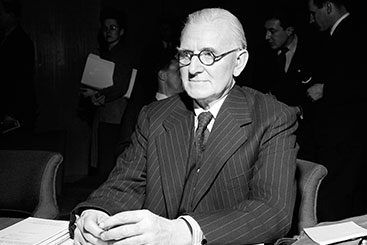

Charles Dukes (United Kingdom)


William Hodgson (Australia)
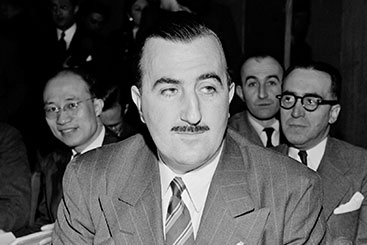

Hernan Santa Cruz (Chile)
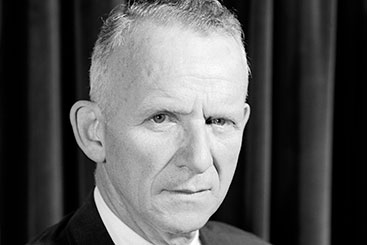

John P. Humphrey (Canada)
 Reference: The Drafters of the Universal Declaration of Human Rights
Reference: The Drafters of the Universal Declaration of Human Rights Vocabulary:
Vocabulary: degrading /dɪˈɡreɪ.dɪŋ/: causing people to feel that they have no value. (synonym: humiliating)
degrading /dɪˈɡreɪ.dɪŋ/: causing people to feel that they have no value. (synonym: humiliating) Examples:
Examples:  It is so degrading to have to ask for money.
It is so degrading to have to ask for money. No one should have to suffer such degrading treatment.
No one should have to suffer such degrading treatment. discrimination /dɪˌskrɪm.ɪˈneɪ.ʃən/: treating a person or particular group of people differently, especially in a worse way from the way in which you treat other people, because of their skin colour, sex, sexuality, etc.
discrimination /dɪˌskrɪm.ɪˈneɪ.ʃən/: treating a person or particular group of people differently, especially in a worse way from the way in which you treat other people, because of their skin colour, sex, sexuality, etc. Examples:
Examples:  Until 1986 most companies would not even allow women to take the exams, but such blatant discrimination is now disappearing. (blatant: apparent and obvious)
Until 1986 most companies would not even allow women to take the exams, but such blatant discrimination is now disappearing. (blatant: apparent and obvious) There should be no discrimination on the grounds of colour.
There should be no discrimination on the grounds of colour. torture /ˈtɔː.tʃər/: the act of causing great physical or mental pain in order to persuade someone to do something or to give information, or to be cruel to a person or animal.
torture /ˈtɔː.tʃər/: the act of causing great physical or mental pain in order to persuade someone to do something or to give information, or to be cruel to a person or animal. Examples:
Examples:  Half of the prisoners died after torture and starvation(=famine).
Half of the prisoners died after torture and starvation(=famine). He revealed the secret under torture.
He revealed the secret under torture. remedy /ˈrem.ə.dɪ/: (LAW) a way of solving a problem or ordering someone to make a payment for harm or damage they have caused, using a decision made in a law court
remedy /ˈrem.ə.dɪ/: (LAW) a way of solving a problem or ordering someone to make a payment for harm or damage they have caused, using a decision made in a law court Examples:
Examples:  We have exhausted all possible legal remedies for this injustice.
We have exhausted all possible legal remedies for this injustice. The court has the power to provide a remedy by way of judicial review
The court has the power to provide a remedy by way of judicial review arbitrary /ˈɑː.bɪ.trər.ɪ/: based on chance rather than being planned or based on reason.
arbitrary /ˈɑː.bɪ.trər.ɪ/: based on chance rather than being planned or based on reason. Examples:
Examples:  Did you have a reason for choosing your destination or was it arbitrary?
Did you have a reason for choosing your destination or was it arbitrary? The garden isn't planned at all - we tend to just plant things in an arbitrary way.
The garden isn't planned at all - we tend to just plant things in an arbitrary way. asylum /əˈsaɪ.ləm/: protection or safety, especially that given by a government to people who have been forced to leave their own countries for their safety or because of war.
asylum /əˈsaɪ.ləm/: protection or safety, especially that given by a government to people who have been forced to leave their own countries for their safety or because of war. Examples:
Examples:  Two years ago he sought/applied for political asylum in Germany.
Two years ago he sought/applied for political asylum in Germany. The refugees have asked for political asylum.
The refugees have asked for political asylum. persecution /ˌpɜː.sɪˈkjuː.ʃən/: unfair or cruel treatment over a long period of time because of race, religion, or political beliefs.
persecution /ˌpɜː.sɪˈkjuː.ʃən/: unfair or cruel treatment over a long period of time because of race, religion, or political beliefs. Examples:
Examples:  They left the country out of fear of persecution.
They left the country out of fear of persecution. A lot of refugees escaped from political persecution during the communist era in the last century.
A lot of refugees escaped from political persecution during the communist era in the last century. adequate /ˈæd.ə.kwət/: enough or satisfactory for a particular purpose.
adequate /ˈæd.ə.kwət/: enough or satisfactory for a particular purpose. Examples:
Examples:  Have we got adequate food for 20 guests?
Have we got adequate food for 20 guests? Children need adequate amounts of nutritious foods to grow up strong and healthy.
Children need adequate amounts of nutritious foods to grow up strong and healthy. articulate /ɑrˈtɪk·jəˌleɪt/: to explain in words, esp. to express something clearly.
articulate /ɑrˈtɪk·jəˌleɪt/: to explain in words, esp. to express something clearly. Examples:
Examples:  She has not yet articulated her vision of why she wants to be governor.
She has not yet articulated her vision of why she wants to be governor. I found myself unable to articulate my feelings.
I found myself unable to articulate my feelings.